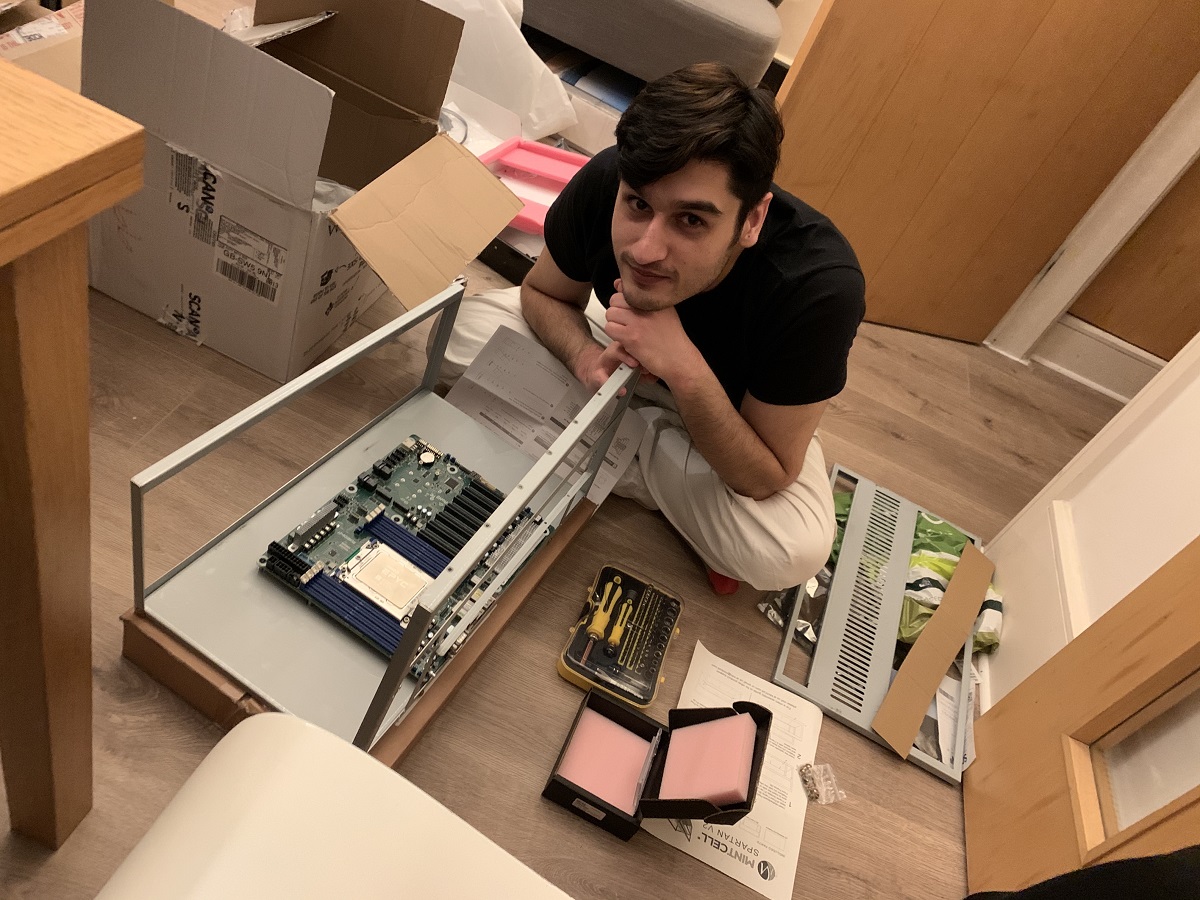We caught up with Sam Tukra on the recent developments of his startup business and how Artificial Intelligence is pushing the boundaries of medical diagnosis.
A PhD student from Imperial College London, Sam applied to Prototypes for Humanity COVID-19 open call in 2020 with his project Foresight, an AI-enabled system that helps to predict early onset of organ failure. The project was selected to join the subsequent cohort of Prototypes for Humanity entrepreneurship programme, making significant improvements to their business plan throughout the journey. Sam founded Third Eye Intelligence, a startup to look after the development of Foresight and related health tech, and was awarded the 2020 Progress Prize for the results and advancements achieved that year.
 Sam built his own data processing unit to streamline Foresight’s development
Sam built his own data processing unit to streamline Foresight’s developmentHow has Foresight progressed since last year?
Since last year, we have completed our prototype to a state that it could be tested in the relevant clinical environment. However, one of the biggest concerns we had was, regarding the procurement of such device in hospitals which is key for future revenue growth and commercialisation at scale. Hence, we formed partnerships with the right entities to de-risk those areas. Firstly, we partnered with University College London (UCL) NHS Trust to run our alpha clinical test, such that we can show the AI algorithm’s efficacy in the relevant clinical environment. Secondly, we partnered with London IVD | NIHR, to generate the relevant evidence needed for procurement by Clinical Commissioning Groups of hospitals, this involved research in health economics, clinical workflow improvement and trial design. All to ensure, at the end we have a solid dossier to showcase the evidence needed for both certification and procurement.
In your opinion, what is the role of academic research for the betterment of our lives and planet?
I think the biggest value they add, is the continuous hunger and search for what’s new in Science. The entire role of academic research revolves around creating new technologies or improving on the ones we have even with limited resources, such that we can push the boundaries of science and move forward to the next generation. This paves the foundation on which future innovative companies are built upon to progress not only our engineering but also our economy. Lastly, to endow the next generation of students with the capability to build the very future we look forward towards.
 Third Eye Intelligence creates AI-enabled medical diagnosis solutions, like Foresight
Third Eye Intelligence creates AI-enabled medical diagnosis solutions, like ForesightWhat are some of your favorite examples of how academic innovation can be translated into real-world products and solutions?
One of the best examples I believe is in the very field I feel passionate about, Artificial Intelligence (AI). AI was not widely used at all in the industry, due to its limitation in generalisation and generally due to the lack of advancement in hardware to support AI. However, a group of researchers did not give up on the idea and built a ground breaking algorithm that is now the de facto method of training our AI algorithms nowadays. This changed the entire field, as industry realised now it’s possible to train and utilise AI models in the real world. With the advent of big data, increased computation power, AI is now considered a norm in many software we see and use today on a daily basis. It all started in academia with the creation of that ground breaking algorithm.
Besides being the winner of 2020 Progress Prize, you also took part in Prototypes for Humanity entrepreneurship programme. How has it helped you to advance your project?
Prototypes for Humanity helped me realise there is more to running a company than just working on a cool idea. Especially in the matter of team building, and understanding the business case for successful commercialisation of the product in the near future. Lastly, it also aided in being able to pitch a complex idea in a simplistic manner such that the audience feel excited about the venture. All of the above, are a huge leap from academia to venture. Hence, I believe GGS aided in evolving me into a better leader for running the business and understanding core risks and how to mitigate them.
As a health-tech startup founder, what is your top entrepreneurship tip to graduates working on future-looking projects?
I would say, take your time to understand your idea and more importantly the problem you are trying to solve. Then only key decisions can be made, it’s vital you take the time to really absorb yourself in what you are building.
